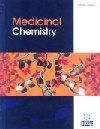Recent Advances in Anticancer Research of Osmium and Rhodium Complexes
IF 2.6
4区 医学
Q3 CHEMISTRY, MEDICINAL
引用次数: 0
Abstract
: Although platinum and ruthenium complexes have been clinically recognized to be the most efficient metal-based anticancer candidates, applied in a wide range of cancer cell lines, their serious toxic effects and drug resistance require the necessity for new metal antitumor complexes. There is excessive interest in the design of new Pt-group metal complexes, including osmium and rhodium, which have revealed great chemotherapeutic potential. They have demonstrated modes of action that differ from those of the most broadly-used in clinical practice platinum- and rutheniumbased compounds. Os and Rh complexes are equipotent to their platinum and ruthenium analogues. Many Os- and Rh-based complexes with strong antitumor activity and low toxic effects have been developed and recognized for their antineoplastic activity in the last few years. Some of them have exposed different action profiles from the conventional anticancer metal complexes. That is why they might serve as a possible alternative that deserves more investigation, though limited studies on their biological effects have been reported, which is in contrast with the classical isoelectronic Pt and Ru complex compounds. Studies of Os and Rh complexes are currently attracting scientific attention. Recent developments of this interesting class of novel chemotherapeutic agents have been reviewed.锇和铑配合物抗癌研究的最新进展
尽管铂和钌络合物已被临床公认为是最有效的金属抗癌候选化合物,可用于多种癌症细胞系,但它们严重的毒性作用和耐药性要求我们必须开发新的金属抗肿瘤络合物。人们对设计新的铂族金属复合物(包括锇和铑)产生了浓厚的兴趣,这些复合物已显示出巨大的化疗潜力。它们的作用模式与临床上最广泛使用的铂基和钌基化合物不同。Os 和 Rh 复合物与铂和钌类似物具有等效性。在过去几年中,许多具有强大抗肿瘤活性和低毒性的 Os 和 Rh 复合物被开发出来,其抗肿瘤活性也得到了认可。其中一些络合物的作用特征与传统的抗癌金属络合物不同。这就是为什么它们可以作为一种可能的替代品,值得进行更多的研究,尽管对其生物效应的研究报道有限,这与经典的等电子铂和钌复合物形成了鲜明对比。Os 和 Rh 复合物的研究目前正引起科学界的关注。本文对这类有趣的新型化疗药物的最新发展进行了综述。
本文章由计算机程序翻译,如有差异,请以英文原文为准。
求助全文
约1分钟内获得全文
求助全文
来源期刊

Medicinal Chemistry
医学-医药化学
CiteScore
4.30
自引率
4.30%
发文量
109
审稿时长
12 months
期刊介绍:
Aims & Scope
Medicinal Chemistry a peer-reviewed journal, aims to cover all the latest outstanding developments in medicinal chemistry and rational drug design. The journal publishes original research, mini-review articles and guest edited thematic issues covering recent research and developments in the field. Articles are published rapidly by taking full advantage of Internet technology for both the submission and peer review of manuscripts. Medicinal Chemistry is an essential journal for all involved in drug design and discovery.
 求助内容:
求助内容: 应助结果提醒方式:
应助结果提醒方式:


